October is Challenge month at HowToPastel. In the 31 days available this month, participants attempt to pastel every single day (posting in the HowToPastel Facebook group). One of the things I decided to do during the challenge was to work in a series. There are some subjects I’ve yearned to paint and the Challenge is an opportunity to dig into a couple of these themes. One of these is laundry on a clothesline.
In Croatia and Venice last month, I often saw and photographed views of laundry hanging out to dry. What a joy to be able to spend days painting these scenes so soon after seeing them.
Since starting to work in a series, I’ve learnt a few things and I’d like to share those lessons and the laundry pieces (nine so far) with you. I also want to share some other big news with you that also ties into the idea of doing work in a series.
But first, here’s my Day 1 painting:

Work in a series can be either about the content, and/or it can be form. This can be a technique or a colour palette for instance. For me, I worked with both content and form – content being laundry on a clothesline and form being a limited palette of Unison pastels (either their 36-piece starter set used for most of these pieces, or their 16-piece half-stick set).
Why a limited palette for the challenge? Well as you probably know, I promote the use of a limited palette as a way to enhance your creativity (check out this blog about this idea), and to allow you to start working with top-quality soft pastels on a budget.
And why specifically Unison pastels?
Well this ties in with my big news!! Recently I was invited to be an Associate Artist with Unison Colour! Such an honour! Their soft pastels have always been a favourite of mine and I chose to use them solely in my work for the DK book, Artists Drawing Techniques (read a blog about that here). The Unison Colour website is being updated and when the new version appears, it will have a page with my bio and art. Being an Associate Artist also means I can create my own selection of pastels so I’m very much looking forward to doing that! I’ll keep you posted about the new website and the collection. UPDATE: My set is ready!
So, back to the artwork and lessons learnt as I created work in a series.
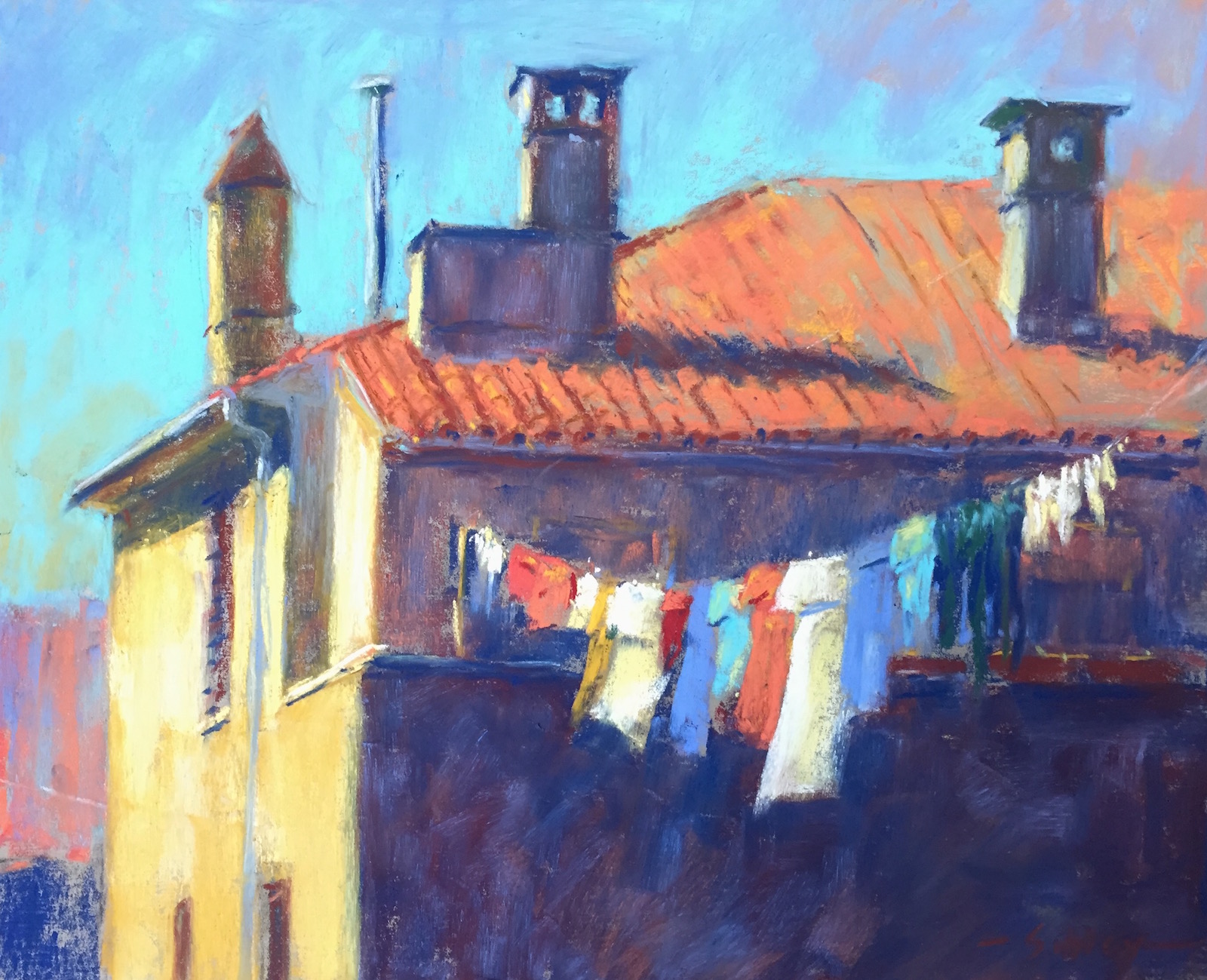
-
1. You don’t have to wonder what to do next when you work in a series
When you have a theme to work on, that feeling of, what am I going to paint next?! disappears. The question is more about ‘how am I going to paint that’ rather than ‘what am I going to paint’? This simplifies and makes things so much easier. I wake in the morning knowing I’m going to paint laundry! This means less time pondering what to paint and more time actually painting.
-
2. The restriction of creating work in a series compels exploration
You might think that being restricted might bore you because of the repetition and focus on one theme. Instead, it offers you freedom to look at the subject from a variety of perspectives. A specific theme allows and encourages you to explore different options in how to portray it: how am I going to interpret this? how am I going to compose it? what colours will I use to say what I want to say? For example, in the laundry series I looked at different compositional formats.

-
3. Limiting your options means looking at ways to work with what you have on hand
This is along the lines of the lesson above but there’s more to it. When we have the ‘freedom’ to create anything, it’s not necessary to make do with what we have. Making do with what we have initiates deeper and more concentrated effort. Out of this kind of constriction can evolve work that you may not have made without being in this uncomfortable position. What’s that saying? – Necessity is the mother of invention. This holds true in art-making as much as it does with other areas of life.
In my case, working with a limited palette (and in the last couple of days, a severely limited palette!), has pushed me to be inventive with colours and layering. I needed to let go of wanting to recreate the actual colours I saw and loved – for example the most delicate of pinks – and paint an approximation of the colours in the right values using the selection at hand. (For an example of what I painted with the severely restricted palette, see “And Life Goes On” below.)

-
4. Work on a series means a deeper look
When you work on one motif through a series, you find that by painting something over and over, you begin to get to know it in a deeper way than you do when you only paint it once. Not only do you examine the content of it from various angles – ie how to paint in – you also find yourself asking why you’re painting it. When you paint a subject once, you may have been attracted by the colour, the light pattern, the details. When you paint, with delight and enthusiasm, a subject a number of times, you start to ask yourself, What’s the attraction? Why do I want to paint this again and again? And these questions go deeper than the more superficial physical attraction.
For instance, as I painted laundry lines over and over, I began to wonder what it was that drew me to this subject. I hadn’t questioned this desire before. As long as I can remember, I’ve been attracted to painting laundry on a clothesline. I knew visually they can create some dynamic shapes either full of colour or with the purity of whites. But as I worked and shared and talked about the pastel pieces I’d created with others, I realized that on a deeper level I was attracted to painting this motif on an emotional level too. It speaks of home and childhood and the comfort that comes with the thoughts and memories of those. I would not have necessarily discovered this reason if I hadn’t committed to work in a series.

-
5. Work in a series acts as a springboard to other ideas
The more you work on a series, the more other ideas spring forth. You can identify more and more ways to delve into the theme. In this way the same theme can be carried further than you initially imagined. You start thinking, how can I do this painting again with a different colour palette, or a different value structure, or a more abstract look, or a more detailed look, or?
-
6. Motivation to get into the studio
Also, as you discover the benefits of working in a series, the more you want to work in a series with another motif. This, along with #5 above, brings an intense desire to get in the studio every day. Passion and excitement about the possibilities motivates movement to the studio. To heck with distractions and procrastination!

-
7. Closer connection to your audience
As I posted images of the series on social media, I realized that viewers were starting to look forward to seeing the next piece in the series. There was a sense of excitement building that I hadn’t anticipated. With this interest has come more comments and conversation about the work. Viewers were going on this journey with me as I created the work in a series. They want to know where it’s going as much as I do. They’re just as involved and committed to the process and the series as I am. It’s as if we’re all involved in some experience bigger and more meaningful than each individual piece of art itself.

-
8. Power in numbers
When you begin to gather all the work in a series together, you realize that the whole collection is somehow bigger than the pieces that comprise it. Yes, you look at each work separately but each piece in a series informs the other and so adds more meaning to it. Multiple works of art from a series speak in a louder voice when viewed together. They create a unified body of work that contain power and allure. Basically what you have is strength in numbers – another unforeseen benefit to work in a series. Together the pieces reveal the commitment, discipline and focus of an artist. This helps when you want a gallery to show your work and it also enhances your own inventory (as does working on a 31-in-31 challenge!).


I think that’s it! I’d love to know if you ever work in a series and if so, do any of these lessons learnt ring true for you?
Next week, I have another fantastic guest blogger for you!
Until next time,
~ Gail
PS. There was some other good news I wanted to share about Unison Colour. As much as I have loved Unison pastels, I did find them expensive to buy here in Canada. Now though, the company no longer goes through a North American distributor. Instead, the pastels are sold directly to retail outlets. This means a significant drop in price and probably greater availability since now smaller art stores can afford to carry them. Yay!!



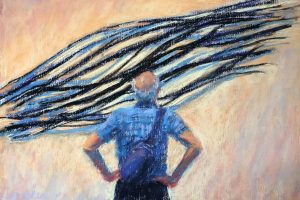







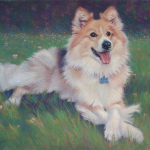


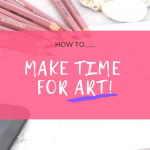


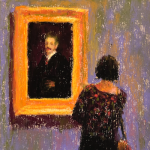
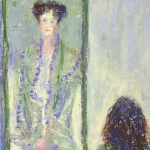
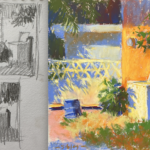




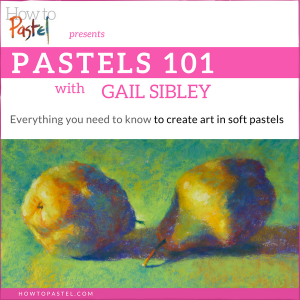

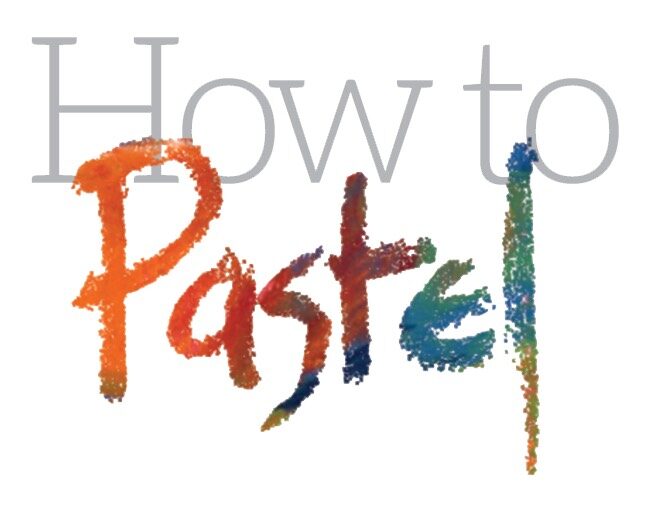

20 thoughts on “Work In A Series – Some Lessons Learnt During The 31-Pastels-in-31-Days Challenge”
I really loved this. So true. An art teacher of mine had me draw 3 rounded rocks every day for 3 months. It is amazing how much the drawings evolved from first to last. At first they were very stiff and done in an obvious way. By the end the drawings had become so much more dynamic and creative as I pursued every way imaginable to portray them. A great exercise! Great article!
Wow Christine, thanks for sharing the exercise you were given to do. That was quite the task!! And it would be an interesting one to try. Hmmmm maybe a challenge for the HowToPastel Facebook group! Wouldn’t they just love me for that 😀
I love “Thinking of Nathalie”. It is very familiar. Love the light, too.
Thanks Ruth! Glad it struck the familiar chord with you 🙂
Loving this series and tempted to start one of my own (on my own and not laundry) as I can see the benefits of working on the same subject.
Thanks Glenys! And yes do try it. Have a look at Christine’s comment about the exercise she was given to do by an art teacher!
The other thing I want to do is take some of the photos I used as source material and rework them some more -in different crops and rearrangements as well as different colour and value schemes.
Hi Gail,
Thanks for this very interesting blog post. Series painting is sort of a “what do you have in your house” adventure. Another thing I find in working in series, is that as you go along, you sort of pare off needless details, and at the end, if you compare the first version to the last one, they are so different (in my experience, the final one is usually the most interesting).
Again thanks for all your tireless work on this blog and the help you give towards our progress.
Smiles
Nancy Malard
Glad you enjoyed it Nancy! Thank you for adding to the conversation about work in a series. And yes, you are so right. As I said in my response to Glenys, I want to revisit and continue on exploring some of the images already painted.
And thanks too for your kind words about the blog which is work for sure but the pleasure I receive from knowing it’s being read and enjoyed, inspiring and educational, makes it all worth it!
Christine’s remark on rocks reminds me of the experience of a contemporary French painter Fabienne Verdier, who went to China to learn calligraphy. It was hard to find a teacher in Mao’s China, but she finally did, and he made her do ONE single horizontal line (the Earth) until he found it had qi, (energy, breath) and she could move on to more complicated figures. I should mention that it took her one whole year to get there….that’s commitment for you.
Cheers,
Nancy
WOW!! Thanks for sharing that story Nancy. Can you imagine? I would love to know what she thought as she created this line over and over – all the various emotions she must have gone through. And how did she feel about the line after a year I wonder. So much to learn isn’t there?!
I love your series Gail! Everything about it, the compositions, colors and how you capture the light through using color on items that would typically be white. Thank you for your blogging. It’s inspired me to want to do a series..now I just have to figure out what!
Thanks sooooo much Berdine!!! Glad you are going to take on doing a series. Look for something that makes your heart jump a wee bit when you see or think about. Don’t angst too much over it. Find a motif and go with it. If you get bored go deeper or quit!!
I love your series!!! It’s so enjoyable! I also like the colors you chose. I’m working on a series myself. This encourages me to go past a series of ’10’.
Thanks Patricia! Great you are working on a series and yes, go until the last bit of juice I is squeezed out of your topic!!
After reading this blog post, I know that what I need to do for at least the next week of the #31in31HTP challenge is to paint a series of sky studies. Thank you for pointing out the benefits of working in a series!
I also want to say what a benefit the Challenge has been to me so far. I was imagining paintings I’d like to try, planning pictures, but NOT putting pastel to paper. So the How to Pastel Facebook group has become my lifeline. The challenge to post every day keeps me working. The gentle feedback encourages me (though I wouldn’t mind some more critical feedback).
Thank you for making so many good things possible!
Ruth I am so looking forward to your sky studies. Glad you are enjoying the group. I know many of us are enjoying you!!
There’s nothing like a challenge to get one painting. Last year when we ce off the challenge, we needed something of sorts to replace it hence the Friday challenge.
As to more critical feedback, once the Challenge is over, feel free to post your work asking for feedback. Just remember to give all the required (!) info (!).
Thanks for sharing your experiences in doing this series. I did have a set of Unisons once; love them, but not the price. Good to know that they may soon be more affordable. Love that umbrella painting. Good stuff.
Thanks Cliff. And yes, I’m pretty excited about Unisons being more affordable! Glad you like the painting. I think you mean laundry rather than umbrella…although I’d like to do a series on umbrellas….
Gail,
I love the variety you have created using this “ordinary” theme. You remind me that a beautiful painting doesn’t require a spectacular subject. Thank you for the inspiration. You’re a treasure!
Steve Morales
Aww thanks so much Steve for your kind words. And yes, it’s amazing what subjects are around us if we only start to see them with artist eyes! Sometimes that takes some effort and so we are blinded to the opportunities. But when we see? Ah the world is overflowing with subjects!